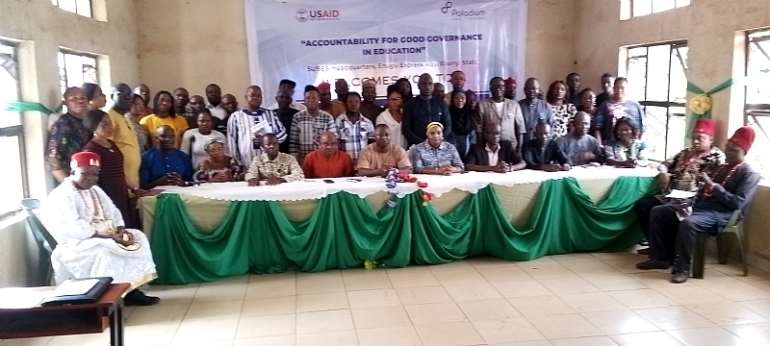Basic Education: Ebonyi Stakeholders Submit Priority Needs for 2024 Action Plan,Task UBEB on Infrastructure,

Furtherance to efforts geared towards improving the quality of basic education across Ebonyi State, community stakeholders have submitted their priority school needs to the State Universal Basic Education Board for inclusion in its 2024 action plan.
The development followed a two-day community town hall meetings held at the UBEB headquarters, August 29 and 30, in Abakaliki, Ebonyi State capital.
The events covering the three Senatorial zones of the State, was anchored by a Nongovernmental Organization, Youthhub-Africa, under the Accountability for Good Governance in Education (AGGE) Cluster project, sponsored by USAID-Palladium.
It was hosted in Ebonyi by the cluster member organization, Development and Integrity Intervention Goals (DIG) Foundation in collaboration with the State Universal Basic Education Board.
The traditional ruler of Okposhi Umuoghara in Ezza North LGA, Ezeogo Anthony Njoku and others who spoke observed that decision on school projects by government without involving the host communities who are the end users does not, most often, address the real needs of community schools.
They identified poor schools infrastructure, inadequate supervision, lack of school furnitures and instructional materials as some of the impediments to basic education in the State.
The stakeholders urged UBEB to provide in the action plan, the construction of adequate and conducive classroom blocks, furnitures, sporting facilities and increased instructional materials.
The Board was also asked to increase provision for effective supervision to check truancy, absenteeism and other vices among teachers and pupils.
Welcoming participants, the UBEB chairman, Mrs Patience Ogodo and the Secretary, Livinus Ezeuwa expressed excitement over the development.
Appreciating Governor Francis Nwifuru for his interest in the education sector, Ogodo commended the National Universal Basic Education Commission (UBEC) for adding value to the functions of the SUBEB.
Ezeuwa added that the Board has it as its priority to improve schools infrastructure as well as check absenteeism and truancy through effective supervision.
The head of Ebonyi Cluster and Executive Director, DIG Foundation, Oliver Chima Aja, in his remarks said the organizations already had advocacy relationship with the State Ministry of Finance, and assured that the outcome of the meetings would be taken into consideration in the State" 2024 Budget.
Aja called on all stakeholders to join hands towards ensuring that funds accruable to UBEB are well appropriated for the benefit of basic education across the State.
In an interview with journalists, the Program Officer, Education, for Youthhub Africa, Peter Ogah, stated that the main aim of the meeting was basically to bring Community members together to collect school needs that are of priority to them.
Ogah explained: "We understand that the usual case before now is for the education secretaries to just go around, however they decide, collect school needs and bring to UBEB.
"But we want a system whereby it is institutionalized and allowed for community members to be effectively involved in the process so that they will be able to also organise school needs that are of priority to them into the action plan that UBEB implement annually.
"The expectation is that the schools needs that the community stakeholders will submit will find their way to the document that UBEB will develop as its action plan for the year, which is technically speaking, the budget that UBEB runs with.
"In other words, the Community members should be involved in the budgeting process, and this is the strategic way of getting them involved in deciding how much goes into the UBEB events and what such resources should be utilized for."
Participants at the meeting were drawn from among traditional rulers, LGA Education Secretaries, Parents/teachers Associations, Civil Society Organizations, religious organizations, Old boys/girls associations as well as the media.
